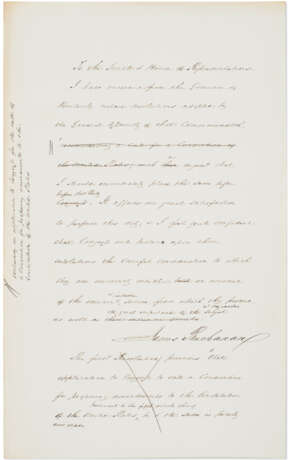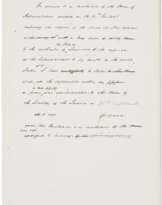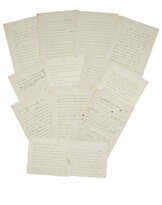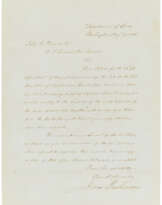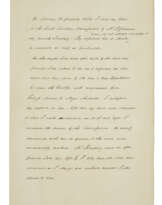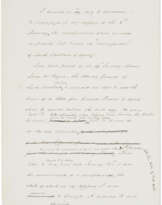ID 1362219
Lot 665 | On the Kentucky Resolutions
Estimate value
$ 20 000 – 30 000
James Buchanan, 5 February 1861
BUCHANAN, James (1791-1868). Autograph draft manuscript signed ("James Buchanan") as President, [Washington, 5 February 1861].
One page, bifolium, 344 x 214mm (light toning at extreme upper and left margins).
In a special message to Congress at the height of the secession crisis, Buchanan transmits the Kentucky Resolutions calling for a constitutional convention in an effort to stave off civil war and restore the Union. Eight states had already seceded from the Union by the time Kentucky proffered its resolution for a convention to, as paraphrased by Buchanan, "for proposing amendments to the Constitution of the United States." The resolutions passed by the Kentucky legislature supported a statewide vote on the merits of the constitutional amendments in an effort to foster a grand compromise to avoid a fracturing of the Union. Kentucky Senator John J. Crittenden had first proposed this series of amendments on 18 December 1860—two days before South Carolina voted for secession. The amendments proposed a restoration of the Missouri Compromise allowing the institution of slavery to expand below the 36° 30′ line to the Pacific; prohibiting Congress from abolishing slavery in any place under its jurisdiction; prohibiting Congressional interference in the interstate slave trade; more stringent enforcement of the fugitive slave laws; and the guarantee that the proposed amendments could never be altered. Although the amendments were voted down, they remained, in various forms, under consideration by several states, including Crittenden's home state of Kentucky, whose legislature voted on 5 February 1861 for the state's voters to consider them.
In his message, Buchanan, expressed his "great satisfaction to perform this duty," offering that he felt "quite confident that Congress will bestow upon these resolutions the careful consideration to which they are eminently entitled on account of the distinguished and patriotic source from which they proceed, as well as the great importance of the subject which they involve." Perhaps most "satisfying" to Buchanan was the Kentucky legislature's fifth resolution stating that it would be "improper, at this time, to call, or take initiatory steps to call a State Convention, to take into consideration the propriety of the State of Kentucky going out of the Federal Union…." ("Letter from Frankfort," Daily Louisville Democrat, 6 February 1861, 1).
The day before Buchanan had delivered this message, a grand peace conference had convened at the Willard Hotel in Washington attended by representatives of fourteen free states and seven slave states including Kentucky, Delaware, Maryland, Missouri, North Carolina, Tennessee and Virginia. Much of what Crittenden had proposed in 1860 was approved by the conference, but it failed to gain traction in the now Republican dominated Senate (voted down 28-7) and never came to a vote in the House. Meanwhile, Congress approved the Corwin Amendment which would have protected the institution of slavery where it already existed, but was silent on the issue of the expansion of slavery in the territories. Soon after Abraham Lincoln took office on 4 March 1861, he dutifully transmitted the Corwin Amendment to the states (see lot 667 in this sale). Predictably, the amendment was ratified by only five states and soon fell out of favor as the crisis deepened into open conflict.
| Artist: | James Buchanan (1791 - 1868) |
|---|---|
| Category: | Services |
| Auction house category: | Letters, documents and manuscripts, Books and manuscripts |
| Artist: | James Buchanan (1791 - 1868) |
|---|---|
| Category: | Services |
| Auction house category: | Letters, documents and manuscripts, Books and manuscripts |
| Address of auction |
CHRISTIE'S 20 Rockefeller Plaza 10020 New York USA | ||||||||||||||
|---|---|---|---|---|---|---|---|---|---|---|---|---|---|---|---|
| Preview |
| ||||||||||||||
| Phone | +1 212 636 2000 | ||||||||||||||
| Fax | +1 212 636 4930 | ||||||||||||||
| Conditions of purchase | Conditions of purchase | ||||||||||||||
| Shipping |
Postal service Courier service pickup by yourself | ||||||||||||||
| Payment methods |
Wire Transfer | ||||||||||||||
| Business hours | Business hours
|
